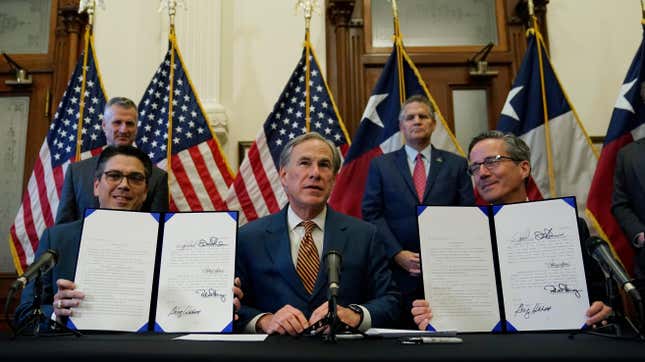
On Tuesday, Reuters reported that The Electric Reliability Council of Texas (ERCOT) predicted this week that the system will see peak highs in energy use this week, topping out at a possible 74,034 megawatts on Wednesday. It’s not super likely that consumers will see problems—but given the state of the grid and the messy reforms it’s endured since the deadly February blackouts, it’s not unreasonable to keep an eye out.
While much of the rest of the country has been experiencing record-breaking heat this summer, Texas has actually been spared from feeling the worst impacts of climate change this year. Even the high temperatures forecast for this week are within the normal bounds for the state in the summer: the average August high in Dallas is 96 degrees Fahrenheit (35.6 degrees Celsius), right around the temperature that’s expected to hit this week. In other words, ERCOT is prepared for conditions like this.
“We’re about to see peak demand for this summer, but nowhere near what demand could reach in an extreme heat wave,” Daniel Cohan, a professor of civil and environmental engineering at Rice University, wrote in an email. “Sure, it will be hot this week, but fairly typical for August in Texas, and without the exceptionally slow winds that can stifle wind power output. So far, Texas has been spared from the record heat that has hit other parts of the country.” Cohan also pointed out that solar installation has doubled in Texas since last year, which provides “a buffer on hot afternoons.”
But the probability that the grid will get through this week doesn’t mean everything is hunky-dory in the Lone Star State. The grid edged close to disaster in June when ERCOT asked customers to conserve energy after a couple of power plants mysteriously went offline during rising summer temperatures. This request followed a panicked notice in April when customers were also asked to keep energy use down after several power plants were offline at the same time for maintenance.
“There’s been years of underinvestment [in ERCOT], and I don’t just mean new generation, but reinvestment in keeping the old equipment operational,” said Ed Hirs, a professor of energy economics at the University of Houston. “We saw that in February, we saw that in April, and we saw it that week in June. The big nightmare is that this equipment may not respond because it simply hasn’t been kept up.”
The clusterfuck of bad luck, poor planning, and mismanagement that caused the outages in February that killed hundreds of people, plunged parts of the state into darkness for days and caused millions of dollars in consumer fees exposed ERCOT for the long-mismanaged mess it is. Despite the thorny tangle of energy-related problems that lay before the state—and the fact that the failure of natural gas facilities was a core part of the problem in February—Republicans in Texas, including Gov. Greg Abbott, were quick to jump on the narrative that frozen wind turbines were responsible for all the state’s problems. (Spoiler alert: they really weren’t.)
In June, Abbott signed two ERCOT reforms into law. One mandated weatherization for power generators and transmission lines to prepare them for extreme weather (although the legislation gives natural gas facilities, a key part of the problem in February’s blackouts, a lot of wiggle room). The other that reshuffled the leadership of ERCOT’s board, most of which resigned or were fired in very public ways back in the spring for completely screwing up management of the grid (remember the commissioner who promised big banks he’d help them keep their profits from the blackouts?).
These changes, in many ways, were the bare minimum to address the harm done in February: the weatherization mandates won’t kick in until next winter, there are no infrastructure improvements for facilities like hospitals or nursing homes, and there’s no consumer relief provision to help folks saddled with monumental electricity bills from the storm. What’s more, the Texas legislature passed bills that would force wind and solar providers to pay extra money to counter government subsidies, furthering the narrative that renewables were solely responsible for the disaster in February.
After signing the reform bills, Abbott proclaimed that “everything that needed to be done was done to fix the power grid in Texas.” That’s... a bold announcement, to say the least. In a move that doesn’t exactly inspire confidence, Abbott’s latest appointment to the ERCOT board selection committee is Arch “Beaver” Aplin, the CEO of convenience store chain Buc-ee’s who doesn’t seem to have any experience in utilities—but who just so happens to be a big donor to Abbott’s reelection bid. (Abbott also gave Aplin a gig as the chair of the Texas Parks and Wildlife Commission, so, it seems, the guy can do anything.)
There’s still a complex nest of problems that face ERCOT, and Abbott’s fixes are nothing but “political theater,” Hirs said. “The governor’s been caught with his pants down, and is desperately praying we get through the summer and the next winter and through the primary season. It’s a real serious problem. Texans have paid billions of dollars, and we’re going to see billions of dollars for these mistakes.”
It’s actually lucky that Texas is facing normal Texas-style summer temperatures, and that the difficulties that plagued ERCOT in February were mostly specific to the winter. But even with the increased attention on the grid, lawmakers still haven’t managed to address the core issues that make the system so unstable. If and when Texas faces new climate-change-driven heatwaves, Hirs said, without reforms, “prices will jump like a son of a gun, and there will be blackouts.”